What's Up, J. Smith-Cameron? The Starry Star on Life, Art and Why She Loves Ben Brantley
J. Smith-Cameron has been a New York stage regular since making her Broadway debut as a replacement in 1981’s Crimes of the Heart. Acclaimed turns in everything from the Our Country’s Good to off-Broadway’s As Bees in Honey Drown followed. Now the actress is back off-Broadway, co-starring as Matthew Broderick’s frustrated wife in her husband Kenneth Lonergan’s self-directed The Starry Messenger, an ensemble piece about an astronomy teacher’s mid-life purgatory. We caught up with the multi-talented Smith-Cameron for a behind-the-scenes scoop on The Starry Messenger—including those nasty pre-opening rumors.
The Starry Messenger has been described as a midlife crisis play. Is that accurate?
It’s more about that poignant part of life that happens after you enter your mid-30s. You’ve built a profession, raised kids past the point where they’re cute babies, and you realize that the romance in your relationship has been eroded by just taking care of the business of life. You spend your youth trying to build to this very place—the kids and marriage and job—and then you get there and it’s extremely vulnerable. When anyone in my age bracket comes to see the play, they go, “My God, this is exactly what I’m going through!”
You’re married to the playwright. Does that mean some of what we’re seeing onstage is your life?
In some places, but not always intentionally! When the play starts, my character’s trying to plan a visit from her mother while also trying to arrange Christmas plans. I realized the other day that I, as myself, am trying to organize my own family coming to see the show and make Christmas plans. At that point I decided not to have that discussion with Kenny, because I don’t want to accidentally start quoting the show!
Does your private life frequently end up in front of an audience?
There’re certainly moments. Years ago, I called him “a serial apologizer.” It shut him up during that fight—and then made it into this script. There’s also a conversation in this play about how one character feels he watched a silent movie of his father’s life when he died, a surreal experience I had when my own father died. I think that’s the way good writers operate, by collecting things that penetrate their own imagination. Kenny loves a well-observed detail. Though it’s interesting—he wrote this play, and my part, before we knew each other.
How did you meet?
I was in Blue Window at MTC, and my then-boyfriend was Brian MacDevitt, the lighting designer. Kenny came to see the play and said to Brian, “Would your girlfriend be interested in doing a workshop of The Starry Messenger?” We didn’t get together then, but it’s interesting how things work out!
Do you and your husband have an artist and muse relationship?
You know, I don’t know if I’ve ever thought of it that way. We have excellent shorthand when communicating, both at work and at home. We both have a similar sensibility and like the same things artistically; that’s one of the things that drew us together, as well as a deep appreciation of each other’s work. But I don’t know if I’d call it a “muse” situation. I don’t really think he’s the type that writes parts specifically for one actor.
This play endured some negative press before it even opened. Has it been vindicating to get excellent reviews and an extension?
Of course! But it blows my mind we had that problem at all, because the preview period exists so we can work all the kinks out. Press isn’t supposed to attend those early shows, and that they’d report on something that happened during a first preview seems so odd. It’s ended up much ado about nothing, but we did feel we had to overcome negative publicity. I should point out that Matthew [Broderick], who has a huge role in a big, sweeping play, wasn’t the only one to call for line. I don’t want to seem defensive. Bloggers have freedom of speech to say what they want. But to open the New York Times and see a piece reporting on our rocky first preview? God bless [Times reviewer] Ben Brantley for being open-minded and giving our show the review he did after all that.
And now that the play’s up and rolling?
It’s even better than when Brantley saw it! We’re in a great groove, and audiences are getting a lot out of it. This is a close-knit cast. And then there’s Matthew, almost always out there onstage, giving a great performance the whole time. The rest of us get to pour out our souls and then go backstage and hang out!
Related Shows
Articles Trending Now
- Death Becomes Her, Maybe Happy Ending, Oh, Mary! and More Earn Nominations for the 2025 Broadway.com Audience Choice Awards
- Maybe Happy Ending Will Be Hitting the Road on a National Tour, Launching Fall 2026
- Ali Louis Bourzgui Reflects on Joining Hadestown, His Upcoming Album and Processing the Experience of Tommy
